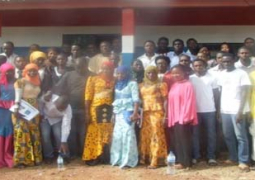The Copyright Act 2004 mandates the National Centre for Arts and Culture (NCAC) to administer the aspect of copyright in The Gambia.
The Act gives the Copyright Office under the NCAC the responsibility to ensure and administer (a) the registration of intellectual property works such as films, books, and music products; (b) to fight piracy and (c) to sensitize the public on copyright issues.
The Act also provides for the creation of an autonomous body or corporate institution called the Gambia Collecting Society, which will collect royalties for artists whose works are used by radio stations, clubs, taxis, hotels, forums, etc. This body should be set up and run by the artists themselves and the NCAC has no role in it except that it occupies a seat on the 9-member board. Yet, the NCAC is actively supporting artists, such as writers, drama and theatre groups, to come together in associations so that the Gambia Collecting Society can start operations.
Speaking in an interview with Point Entertainment recently at his office in Banjul, Hassoum Ceesay, director of Copyright, said that in December 2010 the World Intellectual Property Organisation (WIPO) responded positively to a proposal sent by the NCAC Copyright Office and organised a successful five-day multi-sectoral training workshop on copyright issues.
“This workshop helped to bring salient copyright issues to stakeholders drawn from across the creative arts scenes in The Gambia, and radio stations,” Mr Ceesay said.
The copyright director explained that the copyright office also formulated the first set of draft copyright regulations on registration of works to the AG Chambers, which were adopted and registration of works made in The Gambia, which started in the second quarter of 2011.
Mr. Ceesay added that musicians, writers, painters, sculptors, and filmmakers have come to register their creations. The list stands at 17 as of December 2011, he added.
In pursuance of strengthening the copyright office, Mr. Ceesay revealed that the NCAC has in the last quarter of 2011 submitted project proposal for funding and technical assistance and training of copyright office staff, as well as for Gambian artists, to ECOWAS, UNESCO and GAMJOBS, adding that responses are awaited from these donors.
Director Ceesay added that the copyright office has addressed workshops on copyright and writers organised in consultation with The Gambia Writers Association in October 2011 to sensitize Gambian writers on copyright issues.
Similar outing will be done for musicians and fine artists in 2012, Mr. Ceesay revealed, adding that a comprehensive brochure on copyright in The Gambia has been finalised and now awaits printing to help sensitize the public on copyright issues.
According to him, the copyright office has appeared in local FM stations like KWT to speak on copyright issues.
Added Mr. Ceesay: “In 2011 a draft Cabinet paper was prepared by the copyright office for our parent ministry to enlist the support of government to give seed support to the Gambia Collecting Society to enable them start Act 2004 and other IP legislation that are now in the WIPOLEX database for world reference.”
On the international front, links have been established with BSDA, the Senegal copyright office, Mr. Ceesay noted, adding that The Gambia is now a member of the West African Copyright Network, which groups West African countries with copyright offices and seeks to harmonise anti-piracy activities in the sub-region and the INTERPOL local office.


